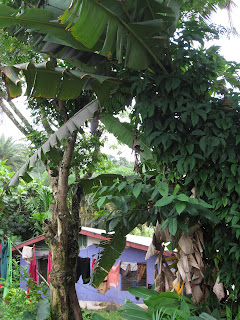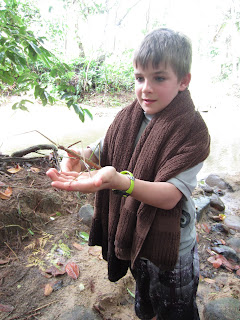I'll tell you one thing, my white skin is not cut out for island living. Fijians never put on sunscreen and never get burned. I'm doing as much sun protection as possible and at this point am trying to keep my skin at a second-degree burn classification.

We wandered outside this morning to keep Kenyon occupied before breakfast. The night before, we had been on our way back home from watching the kids play tag on the beach; Jackson and Alex joined in, and as we walked we heard shouts here and there of "Jackson!". Jackson called to his friends to come by tomorrow; everyone is so welcoming. As we passed a random village kid no more than 11 years old carrying a machete, we asked if he could open it. He made quick work of it, expertly using the machete to rid the hard outer husk and opening a small circle at the top.
Sam wanted to open a coconut this morning, and Mikeli (who lives in Nadi but was in the village for a visit) was a willing teacher. He grabbed the long bamboo pole kept handy just for this purpose and knocked a few down.
Every house has a metal post with a tapered top somewhere outside to use as a coconut opener. Mikeli demonstrated his technique, jabbing it in at an angle and prying a section off.
Sam had a go at it; it takes much more finesse than it looks, as Sam’s first attempt prematurely punctured the inner section. Jackson took a turn…
And so did Kenyon. Mikeli was so kind and patient, and would get Kenyon’s going so he could be at a place to make some progress on it.
The rain here comes fast and hard; here, after some coconut hunting, Sam and Mikeli chat out by the woodshed. In this picture, you can also see the large green tank that collects the plentiful rainwater.
After breakfast, we headed to the beach for a few hours.
The water is a perfect temperature and shallow for quite a ways so there is plenty of room for the kids to play. Sam and Jackson took masks, snorkel and fins (thanks,
Summer!) out further to see some ocean life, and the village kids loved using the mask and goggles.
Fijians also seem to never drink good old-fashioned water. At every meal, we are served Tang; I'm not sure if it's a special drink and we are guests or if that's just the drink of choice. Rainwater is collected and put into a large barrel with a faucet; I was told by the expats we met at the Uprising Resort that the water in the village is likely fine, but to stay away from water in the cities. Traveler's diarrhea and these bathroom conditions is something I would heartily like to avoid, so luckily the water seems to be just fine.
That afternoon, we went on a long walk out into the ocean during low tide for octopus hunting . It's not the season, so we didn't find any, although other marine life was plentiful.
 |
| Alex discovering an amazingly bright blue starfish |
 |
| Kenyon holding a sea cucumber |
Although we didn't see any octopus, Sam did manage to spear a parrotfish, and Benja got one as well.

I was carrying Jackson piggyback back to the village--he had lost his shoes and was barefoot, which makes for a rough go on the coral, and I couldn't take the sun on my skin anymore. As I walked, a tall, handsome young man far behind me said, "Bula!" and asked if he could carry my son for me. He also offered to go back and look for Jackson's shoes. I declined, but we walked together and learned that his name was Tocana and that he played rugby and worked at a resort. He was from Namatakula but had traveled to Vancouver and Japan with his rugby team. As we continued, he again asked if he could carry Jackson for me. He put Jackson up on his shoulders, which made for a more pleasant walk. He led me back to Simon and Judith's house, and from the young kids excitedly calling his name as he passed, you could tell he was very well-liked in the village. This is the kind of warmth and friendliness that is the norm in the village; everyone cares for each other--even outsiders like us.
For our last dinner, they prepared a traditional lovo feast--a meal that is baked with hot stones underground, and is reserved for special occasions like weddings, birthdays and funerals. Cassava and sweet potato are placed in a gorgeously-wrapped palm casing and placed in an underground fire to cook with hot stones under large taro leaves.
They also add other bundles of meats, and the taro and palm leaves along with the underground roasting add a wonderful smoky flavor.
 |
| peeling back the taro leaves to reveal the cooked food |
 |
| opening the palm leaves to expose the cassava and sweet potato |
 |
| Jacob and Sala bringing in the roasted cassava and sweet potato |
Live crabs from yesterday's crab hunting were boiled with freshly shredded coconut. Ili, Judith's daughter-in-law, painstakingly removes all the meat from the crabs, adds chopped onions, and then places the meat from a few crabs back into one shell. This was by far the most delicious food I had during my stay (or for as long as I can remember, for that matter). Rosa does most of the other cooking and we rarely saw her outside of the kitchen.
 |
| the wonderful chef, Rosa |
In the morning, it was time to go. We took some final pictures with everyone, and I shed a few tears as we left (surprise, surprise).
Such wonderful people and especially wonderful kids; I really love them. I look forward to printing out pictures of them and sending some their way.
After leaving the village, it's one night in a hotel near the airport and on to Sydney! I couldn't have imagined Fiji would have been as enriching as it was; it feels like we've been gone 6 months, not 5 days. We're now ready to settle into our home for the next year!
 |
| goodbye Fiji... |























































